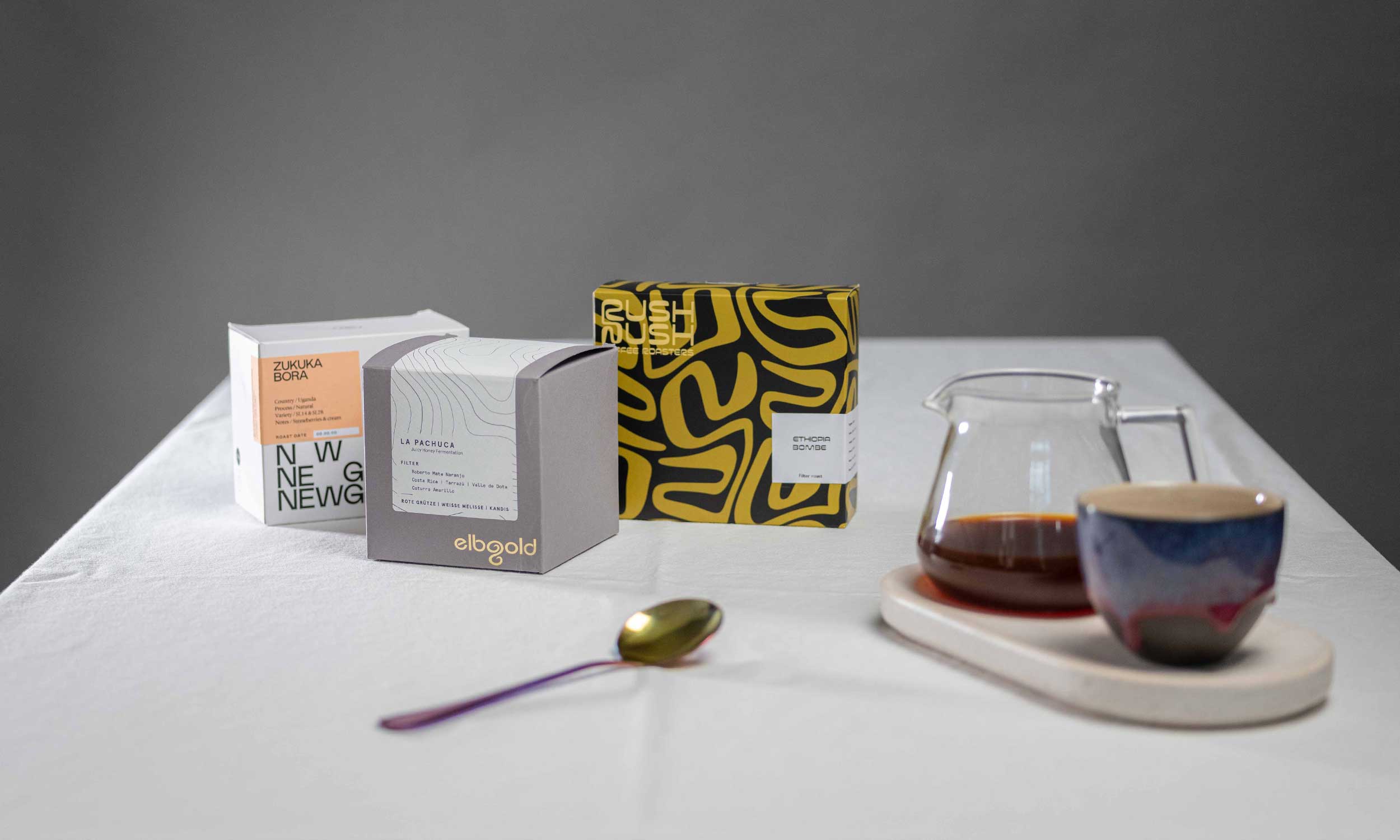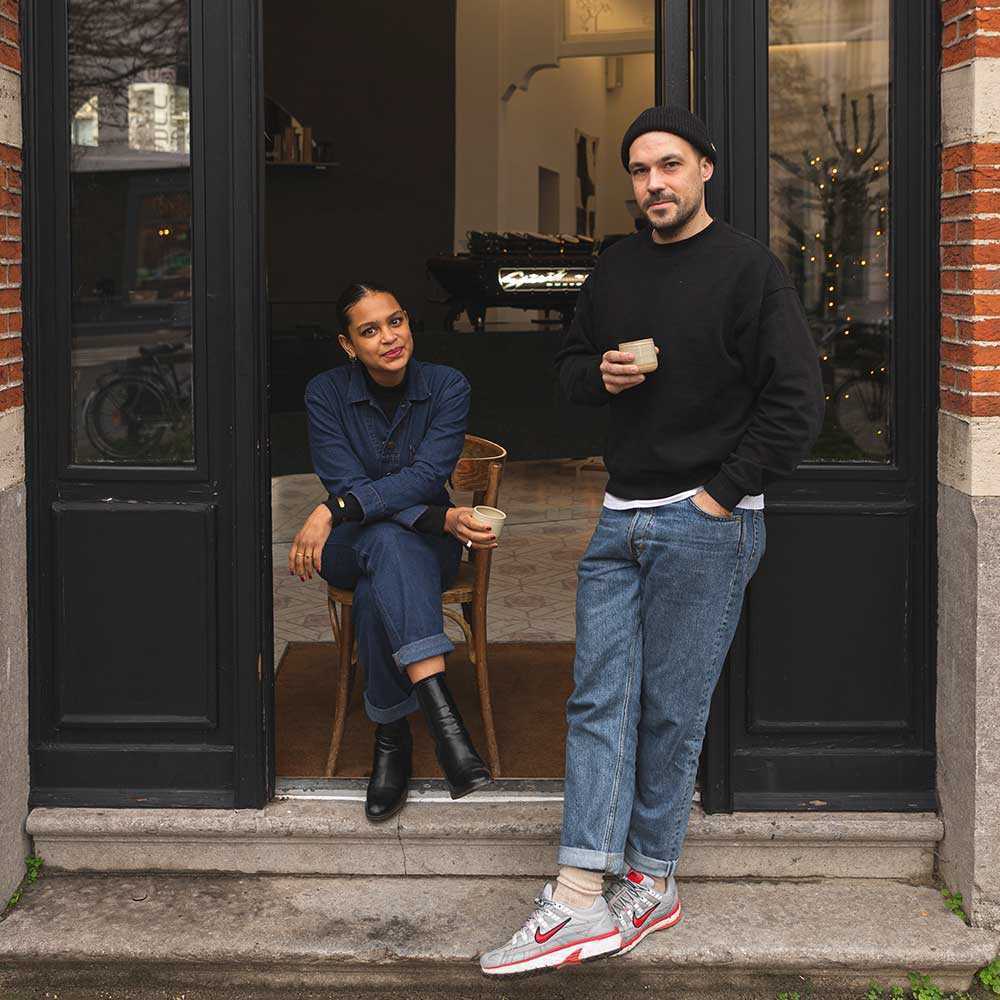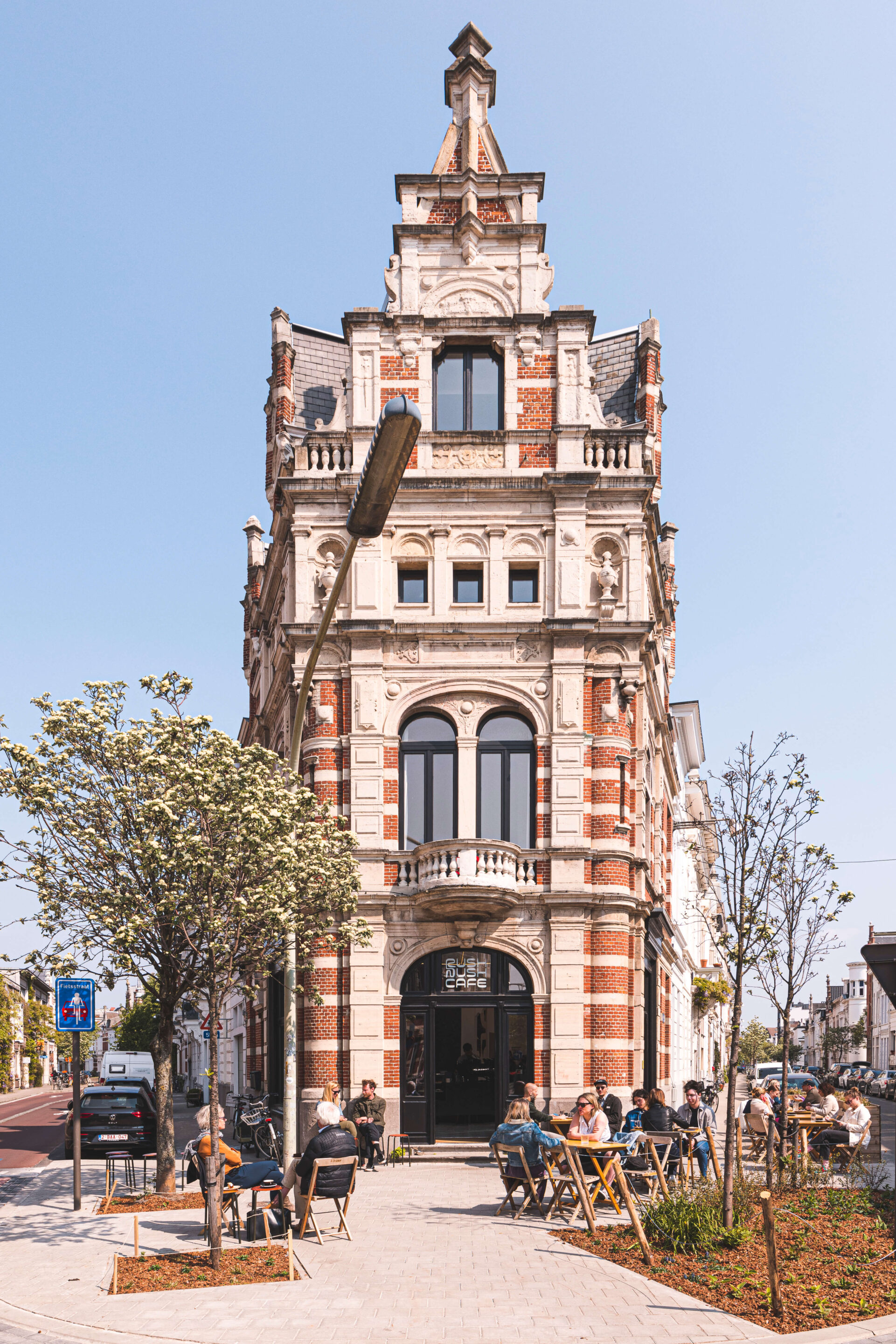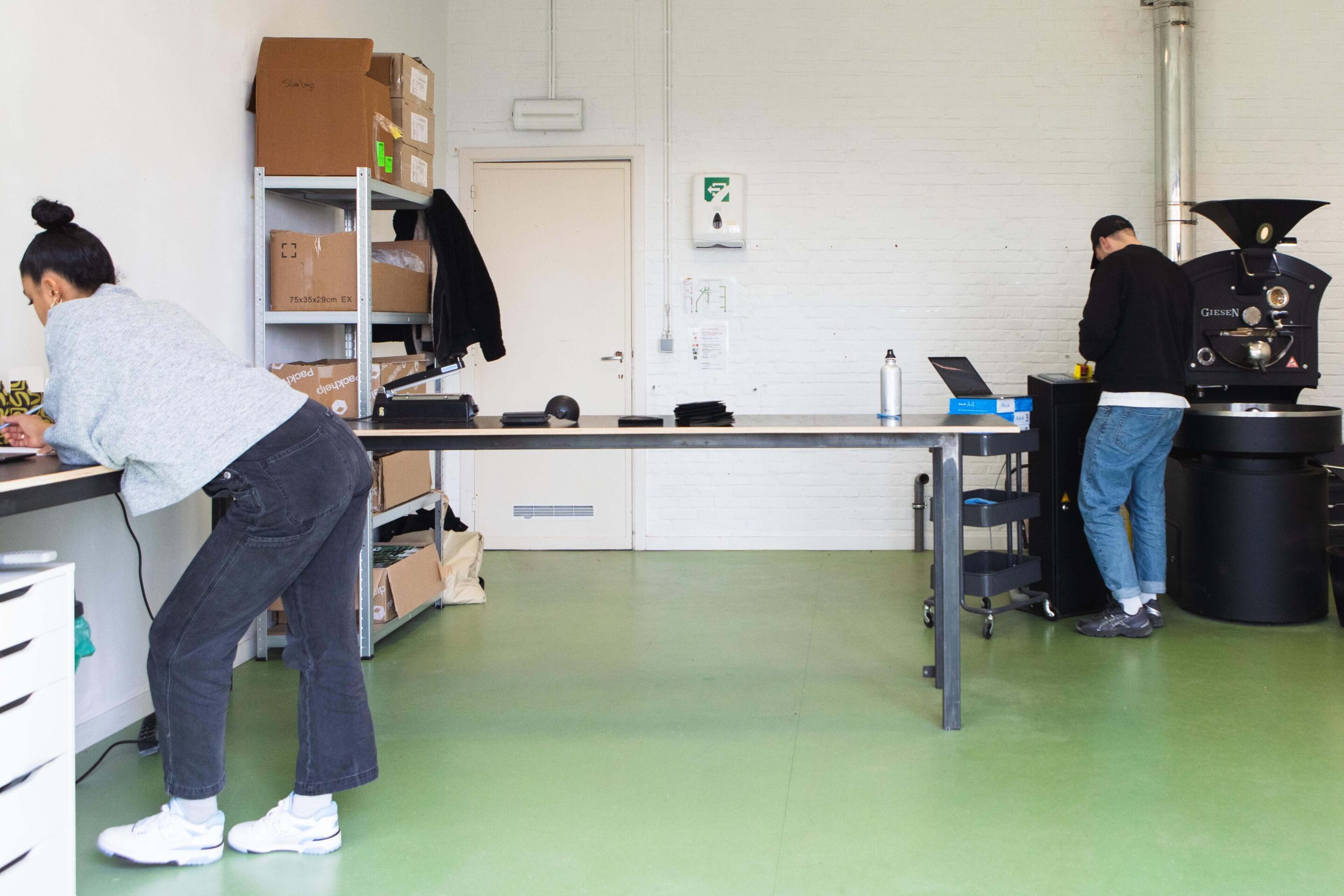Starting a family business can be a very challenging affair. Not every couple that stays together, slays together. As my boyfriend and I experienced earlier this year when we had a short stint of being business partners, expanding your mutual activities to also include work can lead to a lot of tension and potential fall outs that are better avoided.
But that’s not everyone’s story. There are many couples out there who indeed work very well together and decide to start a business because they’re both passionate about the same matter. Like specialty coffee.
One of the three talented October roasters who we will be working with for the upcoming Coffeevine box is a relatively new brand from Antwerp in Belgium that was started by Simon Derutter and his girlfriend Nanigui Patel in 2020. Rush Rush is the name and the name says it all.
As the duo shared in this in-depth interview, the road to their flourishing business of the present day was not an easy one and yet, perseverance and creativity got them through what was undoubtedly one of the darkest periods for many small businesses out there. Now, Rush Rush is preparing to make its debut in the upcoming Coffeevine box with a beautiful floral washed Ethiopian coffee from Bombe.
THE COFFEEVINE (TC): “I understand that both of you worked in specialty coffee before you started Rush Rush together. Were you colleagues or maybe even competitors?”
Nanigui Patel (NP): “I previously worked at Caffènation for many years both as a barista and then also in their kitchen, running their breakfast, lunch and brunch service. But that’s not where we met. In 2018, I competed in the Belgian Aeropress Championship and that’s where Simon saw me for the first time.”
TC: “Were you both competing there?”
Simon Derutter (SD): “No, I was just in the crowd.”
NP: “That was the year I won the Belgian Aeropress Championships and afterwards, Simon texted me and now we’re here, ha ha.”
TC: “Oh my god, how fun! And Simon, what is your story with coffee? I know you used to work at MOK. Is that were you started your journey?”
SD: “Actually, I used to live with Jens Crabbe (founder of MOK) while I was a roof topper. And on rainy days, he said to me ‘why don’t you come and hang out at my roastery for a bit?’ So, there I was. Spending time at the roastery and learning as much as I could by tasting things. And when the day came that he opened MOK Brussels, I said to him ‘OK, I want in.’
Jens said ‘alright’. At that time, his business was growing a lot and I was already going to meet customers and so on and then, step by step, I started working there full time. First, I did all of the packing for about a year and then I started roasting. I think I roasted there for about 2 and half years.”
TC: “And while you were there, you roasted some MOK coffee for one our past boxes, didn’t you?”
SD: “Yep. There was a box that I roasted some coffee for. It’s a small world.”
TC: “OK, so then you guys simultanously decided to start a business together as a couple or was there another step in between?”
NP: “We both felt like our times at Caffènation and MOK were over but we didn’t immediately plan to start a business together. We were even thinking ‘maybe we should take a gap year and go cook somewhere in France where Simon could learn more about wine’, which is something he’s really interested in. Yeah. It was the first plan.
But then I started working in a small coffee bar near Antwerp called KAWA, which also used MOK and Simon knew them from doing deliveries. The couple that runs the place wanted to take a break and asked us if we wanted take over from them for a while. That was the first experience for us working together as a couple. It was horrible, ha ha! We hated it!
But then Covid hit and we suddenly found ourselves spending a lot of time at home and we thought ‘well, coffee is still our passion so maybe we should start something in coffee.’ We thought, maybe just a coffee bar with different guest roasters or something. Definitely not roasting.”
“I wanted to have fun again in coffee.”
SD: “The roasting part actually came about a bit randomly. One day, I went for a walk with a friend and he said that he was looking for a roaster to work with. And that got me thinking that maybe I should roast again. It was a private label job and decent amount to get started with. At first, we thought we could use the roaster at Caffènation but it’s a 30kg beast and clearly too big for our needs at the time.
Then the owners of KAWA said that they had a permit to put a roaster in their space and they even had a plan for it. So we went ahead and bought a 6kg Giesen and rented 2m² of space from them. I was basically roasting inside a small glass box for everyone to see. But what I hadn’t shared was that one week before the roaster arrived, the private label deal fell through.”
TC: “No! That’s insane! What did you do then?”
SD: “Well, KAWA said they’d take some of our coffee but then they went on holidays for five weeks and we really had to figure out quickly what to do.”
TC: “You were in a rush rush, basically. Pardon the pun.”
SD: “It was a challenging time for us. Funnily enough, at the time, we were living on the same street where our café is now and we kept passing this space on our bike and one day, it said ‘FOR RENT’ on the door. I said to Nanigui ‘fuck yes, we need this place.’ A few weeks later, we had the keys.
NP: “In the beginning, we had very few clients and did most of our sales via the webshop and some home deliveries in Antwerp but we also still worked at KAWA for a few months because we needed the income but then between September and October we took the time to properly build our coffee bar.
We officially opened just one week before the second lockdown. For a few days, people could sit indoors with a mask on before we had to close and then, we only did takeaway for almost a whole year. This was actually great because a lot of people had nothing to do so they were wandering around the neighbourhood and got to know us. After a while, we started doing these cool specials like waffles or eclairs on Sundays that our designer made unique posters for and these were super popular.”
TC: “I know from talking to many café owners during the lockdowns that these were some of the most profitalbe times they ever saw. Low overheads, high profits, no lingering customers who drink one coffee and then work on their laptops for hours. I think, if you can make it through a tough period like this, then you can weather almost any storm. Let’s fast forward to today. You now have a flourishing café and roastery. How do you split your tasks?”
NP: “We have a kitchen in our bar and we try to make the majority of things ourselves. The roastery, we run together. For me, this was definitely a learning process as I never roasted before. But now, with the baby (expected to arrive in mid-October) on the way, we have another colleague who is working in the roastery. This is really our thing together and something that we could see ourselves doing from anywhere in the future.
“We wanted to do something that was more in your face.”
What’s crazy though is that when we started two years ago, it was just the two of us and now, there are seven people working here in total. Our weekends are particularly intense but it’s also nice because we are a bit outside of the city center and I feel like people who come here want to take their time.”
TC: “Fab! I can’t wait to visit myself. Now, tell me a bit about your sourcing philosophy. What makes Rush Rush different from other roasters in Antwerp? Do you have a particular taste for experimental coffees or do you prefer to focus on the classics and do them really well?”
SD: “That’s a nice question. A year ago, I struggled defining what our identity is, asking what our place in the market is? At MOK, I had the luxury of working with whoever I wanted. Every importer would answer your calls, every coffee was on the table. But when we started Rush Rush, things were a bit more challenging. Great coffees were more difficult to get hold of and many importers said that our low volumes at the time made it impossible for them to work with us.
We were really trying to keep up with the changes in the coffee market but as you know, things are very dynamic and the great stuff sells out super fast. After a year, I started to really reconsider who I wanted us to be and decided that yes, we wanted to be more niche.”
TC: “Do you mean that you wanted to offer more exotic and unusual coffees?”
SD: “Yes. I wanted to have fun again in coffee. In Antwerp, there is something that many people refer to as the ‘blend war’ whereby many people are dropping their prices and offering lesser coffees. I don’t want to be a part of that. So we asked ourselves, ‘who do we want Rush Rush to be?’ And the answer kind of came from our head barista Daniel Weinraub who presented our coffees in the most wonderful way. He really takes his time and goes out of his way to make you a fresh Aeropress because that’s what he believes in. He will always taste the first shot of espresso before you get yours.
The other thing we decided was that we wanted to be the guest roaster for different cafés around the world. And it was kind of perfect timing because someone in Paris picked us up and we were guest roaster at Fringe for a while. That really gave us a boost. And I started looking for more exotic stuff. One of them was a coffee from El Salvador that was called ‘frozen cherry’ that was deep frozen by the producer and then processed. Another was an SL28 from Kenya but grown in El Salvador. Crazy stuff like that.”
TC: “So, essentially, you’re trying to be the total opposite of what’s common in Antwerp. Maybe comparable to the difference between a classic wine shop and a natural wine shop?”
SD: “Well, the other consideration was that I didn’t want people to think ‘oh, he’s just going to do the same thing he did at MOK.’ MOK’s coffees are super complex and beautiful. We wanted to do something that was more in your face.”
NP: “I feel like the importers now also know what you’re looking for. Before, it was difficult to explain what we wanted but now, they are coming with suggestions themselves, which is great.”
TC: “I mean, if I just look at your packaging, it’s super fun and actually does not at all suggest that there’s coffee inside. I feel like you’re a brand that is really doing its own thing and doesn’t care what others think. Tell me, what’s your signature dish at the café?”
NP: “We definitely try to offer something other than the typical toasts. For instance, we have a really good vegan sausage roll that people go crazy over. We also had a super good waffle on the menu for a while and when we took it off, people went apeshit so we have to bring it back, ha ha.”
TC: “And do you have a signature beverage?”
SD: “Definitely the Aeropress. That’s our thing. I know that in many other places like Amsterdam it’s quite challenging to get a freshly brewed filter. Everyone just has the batch brew because it’s usually too busy but here, even if it takes ages, we want to make sure you get a super tasty Aeropress and people totally come back just for that.”
TC: “Thank you for your time.”

This coffee is part of our upcoming October 2022 Coffeevine box that also features other delicious coffees from Newground and Elbgold. To choose your ideal box and get in on the fun, just pop over to our shop now.





